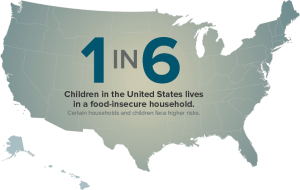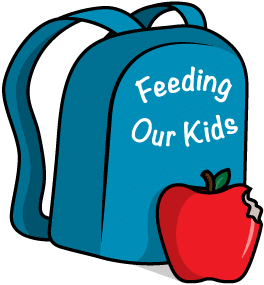by Crystal Yuan, Feeding Our Kids Summer & Fall Intern and Psychology Student at UIUC
According to multiple studies, childhood food insecurity can result in serious consequences on physical health, academic performance, general development, and mental health. For mental health, food insecurity can cause significant psychological stress, depressive disorders and increase the risk of other mental illnesses. The research also indicates that the effects of food insecurity on the mental health of children are more adverse on them than on adults.
McLaughlin and colleagues analyzed data from 6,483 adolescents ages 13 to 17 for their research and found that food insecurity was correlated with 14 percent higher odds of a mental disorder—including mood disorders, anxiety, behavior and substance disorders. Studies found out that food insecurity at home affects non-cognitive performance at school. Professor Howard also mentioned in his paper that food insecurity could also be a cause of difficulty in making and maintaining friendships. More research demonstrated that the percentage of children with a behavior problem increased with rising food insecurity.

Pic credit to: Food Research & Action Center. (2019)
As mentioned above, the impacts of food insecurity are especially pronounced for those in childhood, and influences them differently depending on the age. Infants and toddlers who experience food insecurity may struggle with attachment, behavioral problems and cognitive development. In early elementary school, food insecurity impacts academic performance such as reading and math skills, weight gain and development of social skills. Higher elementary grade children who experience food insecurity are at a greater risk for repeating a grade, while adolescents suffering from food insecurity had higher odds of a mental disorder (as noted above) —including anxiety, behavior and substance use disorders, and even suicide.
Cited from:
Alaimo, K., Olson, C. M., & Frongillo, E. A. (2001). Food insufficiency and American school-aged children’s cognitive, academic, and psychosocial development. Pediatrics, 108(1), 44-53.
Cook, J. T., & Frank, D. A. (2008). Food security, poverty, and human development in the United States. Annals of the New York Academy of Sciences, 1136(1), 193-209.
Heiman, P & Barthle, C. (2016) The Impact of Food Insecurity on Child Well-Being. Youth Today.
Howard, L. L. (2011). Does food insecurity at home affect noncognitive performance at school? A longitudinal analysis of elementary student classroom behavior. Economics of Education Review, 30(1), 157-176.
McSilver Institute for Poverty Policy and Research. (2009) New York University Silver School of Social Work
Mammen, S., Bauer, J. W., & Richards, L. (2009). Understanding persistent food insecurity: A paradox of place and circumstance. Social Indicators Research, 92(1), 151-168.
Jyoti, D. F., Frongillo, E. A., & Jones, S. J. (2005). Food insecurity affects school children’s academic performance, weight gain, and social skills. The Journal of Nutrition,135(12), 2831.
More information linked here:
Food Insecurity and Mental Health: https://www.moveforhunger.org/food-insecurity-and-mental-health/
Household food insecurities: Threats to children’s well-being: https://www.apa.org/pi/ses/resources/indicator/2012/06/household-food-insecurities
